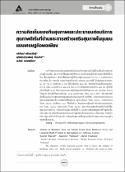บทคัดย่อ
การวิจัยโดยการสำรวจความคิดเห็นเกี่ยวกับบริการสุขภาพดีเริ่มที่บ้านเป็นบริการสุขภาพเศรษฐกิจพอเพียง ของเจ้าหน้าที่ทีมสุขภาพผู้ให้บริการ และประชาชนผู้รับบริการสุขภาพดีเริ่มที่บ้าน โดยเลือกกลุ่มตัวอย่าง เจ้าหน้าที่ทีมสุขภาพผู้ให้บริการสุขภาพแบบเจาะจง จาก 4 ภาคตัวแทนของประเทศไทย คือ ภาคเหนือ ภาคตะวันออกเฉียงเหนือ ภาคกลาง และภาคใต้ ได้กลุ่มตัวอย่างจังหวัดละ 60 คน รวม 4 จังหวัดจาก 4 ภาค ได้ตัวอย่างรวม 240 คน ส่วนประชาชนถูกเลือกแบบเฉพาะเจาะจงภาคละ 1 จังหวัดๆ ละ 120 คน รวม 4 ภาค ได้กลุ่มตัวอย่างประชาชน 480 คน ผู้วิจัยได้สร้างเครื่องมือ 2 ชุด เป็นแบบสอบถามความคิดเห็นของเจ้าหน้าที่ทีมสุขภาพและประชาชน จากการวิจัยพบว่า เจ้าหน้าที่ทีมสุขภาพร้อยละ 83.2 และประชาชน ร้อยละ 79.4 เห็นว่า บริการสุขภาพดีเริ่มที่บ้านเป็นบริการสุขภาพเศรษฐกิจพอเพียงในระดับมากถึงมากที่สุด ระดับความพึงพอใจในบริการสุขภาพเศรษฐกิจพอเพียงของเจ้าหน้าที่ทีมสุขภาพอยู่ในระดับมาก ร้อยละ 55.80 ระดับปานกลาง ร้อยละ 42.90 และร้อยละ 1.30 ที่ไม่เห็นด้วย ส่วนประชาชนผู้รับบริการมีระดับความพอใจระดับมาก ร้อยละ 71.50 ระดับปานกลางร้อยละ 28.50 จากระดับความคิดเห็นของเจ้าหน้าที่ทีมสุขภาพและประชาชนเกี่ยวกับบริการสุขภาพดีเริ่มที่บ้าน และบริการสร้างเสริมสุขภาพดีในชุมชนเป็นบริการสุขภาพองค์รวมที่สอดคล้องกับระบบเศรษฐกิจพอเพียงในระดับมากทั้งสองกลุ่ม จึงสรุปว่าบริการสุขภาพดีเริ่มที่บ้านและบริการสร้างเสริมสุขภาพดีในชุมชนเป็นบริการสุขภาพแบบเศรษฐกิจพอเพียงที่เหมาะสม
บทคัดย่อ
The objectives of this empirical research were to survey the attitudes of
healthcare teams and health service recipients in Thailand with regard to home healthcare services and community health promotion as services in a sufficiency
economy. There were two groups of samples: health personnel who provided home
health care and the people who received home health care in four regions of
Thailand, i.e., the Northern, Northeastern, Central and Southern regions. Sixty health
personnel were purposively selected from one province in each region, making 240
subjects for the personnel team; 120 people were purposively selected from one
province in each region, making 480 subjects for the healthcare recipient group.
The results showed that 83.2 percent of the persons in the personnel team and
79.4 percent of the healthcare recipients thought that home health care was a
sufficiency economic service. While 55.8 percent of the health personnel were very
satisfied with home healthcare services in providing sufficiency economic services,
42.9 percent were moderately satisfied, and 1.3 percent were not satisfied; 71.5
percent of the people in the subject group had experienced highly satisfactory
services and 28.5 percent considered such services as moderately satisfactory.
In conclusion, both health personnel and health service recipients accepted that
home health care and community health promotion represented sufficiency economic
health services.


